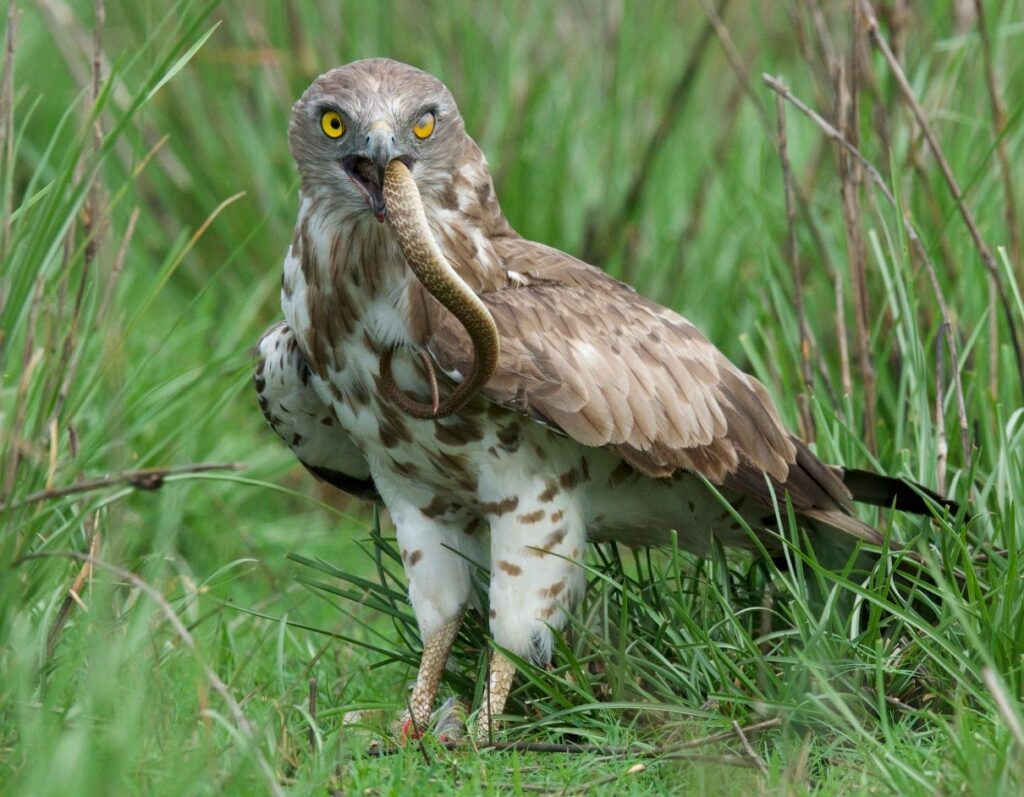Eagles are well-known for their opportunistic feeding behaviors. These birds will eat live animals, freshly-killed prey, and carrion. Their hunting habits may seem ruthless, but their foraging abilities have saved many species (like the Bald Eagle) from the brink of extinction.
Eagles are intelligent hunters who will kill and eat snakes. The eagle will not pass up a meal if it finds one. Every bit of food counts!
Each eagle species will have its own food preferences. As a result, some might eat more snakes than others.
What Type of Eagles Eat Snakes?
Most eagles are willing to eat a snake to get a good meal. However, the Bald Eagle, for example, does not eat that many snakes; the Bald Eagle eats fish, mammals, and small waterfowl.
Unlike the Bald Eagle, snake eagles are found across Africa, and they prefer to eat snakes. These eagles are known for their brilliant hunting displays, where they will soar in the air until they catch sight of a snake on the ground far below. In a sudden swoop, the snake eagle will grab the snake for its next meal.
Brown Snake Eagles have thick scales on their talons to prevent venomous snake bites. As a result, these birds can eat and attack cobras. Many other snake eagles, such as the Short-toed Snake Eagle, will eat non-venomous lizards and reptiles as opposed to more dangerous species.
All eagle species have strong stomach acids, making it possible for them to eat venomous snakes. While snake eagles are best known for dining on snakes, other species will do the same when given the opportunity.

Can an Eagle Kill a Snake?
Eagles have powerful talons and beaks. These magnificent birds could most certainly kill a snake and are willing to.
The eagle will hunt a snake by soaring high into the air. When it catches sight of prey on the ground below, it will swoop down and seize the animal in its talons. The massive impact of the eagle’s body on a snake, coupled with the bird’s ferocious claws, will likely kill the snake.
While eagles are willing to kill snakes, these reptiles do not make up most of their diets. Snake eagles are an exception to this, as they prefer to eat snakes.
The resilient intelligence of eagles makes it so that they are willing to do whatever it takes to survive and raise future generations of their species.
Could a Snake Defeat an Eagle?
Yes, it is possible for even a non-venomous snake to take down an eagle. If the snake could bite the eagle or coil around the bird, it could kill the larger animal. However, with an eagle’s power, the snake would likely not live to tell the tale; the eagle would fight back against the snake with its talons and beak. The snake would presumably be injured and die as a result.
This will also vary based on the size of the snake and the eagle. A Garter Snake would not have the same power as a Timber Rattlesnake. Additionally, a younger eagle might not have the same strength or wits as an adult and might make an error in its attack.
What Else Do Eagles Eat?
All eagles, based on their region and the time of year, will have a different diet based on what they can scavenge. This is why some eagles eat a lot of snakes and others do not touch these reptile species nearly as often.
Eagles are carnivorous, meaning they will eat almost exclusively meat. They might hunt for fish, small mammals (like squirrels, prairie dogs, and rabbits), small birds, and snakes.
If an eagle comes across an injured or dead animal, it will eat that, too. If an eagle eats a large mammal, it is likely because the bird found its remains nearby.
The eagle knows when it can win in a fight. The eagle will not enter into a sparring match for no reason. This is why eagles do not regularly go after bears and bobcats.
What Would Eat an Eagle?
The eagle is at the top of the food chain, so the adult has no natural predators. However, a young eagle chick is relatively defenseless. They may be preyed upon by other species, such as mountain lions, bobcats, black bears, foxes, and large birds.
Eagles produce less young when compared to other birds. They live as food chain royalty and use their opportunistic feeding senses to forage for roadkill and hunt for whatever they can find–even snakes!
